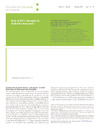Please use this identifier to cite or link to this item:
https://accedacris.ulpgc.es/jspui/handle/10553/43060
| Title: | Role of IGF-1 receptor in radiation response | Authors: | Valenciano, Almudena Henríquez-Hernández, Luis Alberto Moreno, Mercedes Lloret, Marta Lara, Pedro Carlos |
UNESCO Clasification: | 320101 Oncología 3208 Farmacodinámica |
Keywords: | Growth-Factor-I Squamous-Cell Carcinoma Strand-Break Repair Lung-Cancer Cells Annexin-Ii, et al |
Issue Date: | 2012 | Project: | FIS 1035/98 0855/01 |
Journal: | Translational Oncology | Abstract: | Insulin-like growth factor 1 receptor (IGF-1R) is a transmembrane receptor tyrosine kinase involved in the development and progression of cancer whose activation strongly promotes cell growth and survival. IGF-1R exerts its main actions through the activation of the mitogen-activated protein kinase and phosphoinositide 3-kinase pathways. In addition to their traditional roles, IGF-1R activation has been associated with increased radioresistance both in vitro and in vivo, although the molecular mechanisms behind this process are still unclear. Recently, IGF-1R has been associated to new partners as major vault proteins, BCL-2, BAX, or Ku70/80, related to radiochemotherapy resistance, regulation of apoptosis, and nonhomologous end-joining DNA repair. Here, we review these novel associations of IGF-1R trying to explain the resistance to radiotherapy mediated by IGF-1R. Finally, we revised the role of new therapies leading to block the receptor to enhance the efficacy of radiation. © 2012 Neoplasia Press, Inc. All rights reserved. | URI: | https://accedacris.ulpgc.es/handle/10553/43060 | ISSN: | 1936-5233 | DOI: | 10.1593/tlo.11265 | Source: | Translational Oncology [ISSN 1936-5233],v. 5(1), p. 1-9 |
| Appears in Collections: | Reseña |
SCOPUSTM
Citations
60
checked on Jun 8, 2025
WEB OF SCIENCETM
Citations
56
checked on Feb 8, 2026
Page view(s)
169
checked on Sep 27, 2025
Download(s)
102
checked on Sep 27, 2025
Google ScholarTM
Check
Altmetric
Share
Export metadata
Items in accedaCRIS are protected by copyright, with all rights reserved, unless otherwise indicated.
